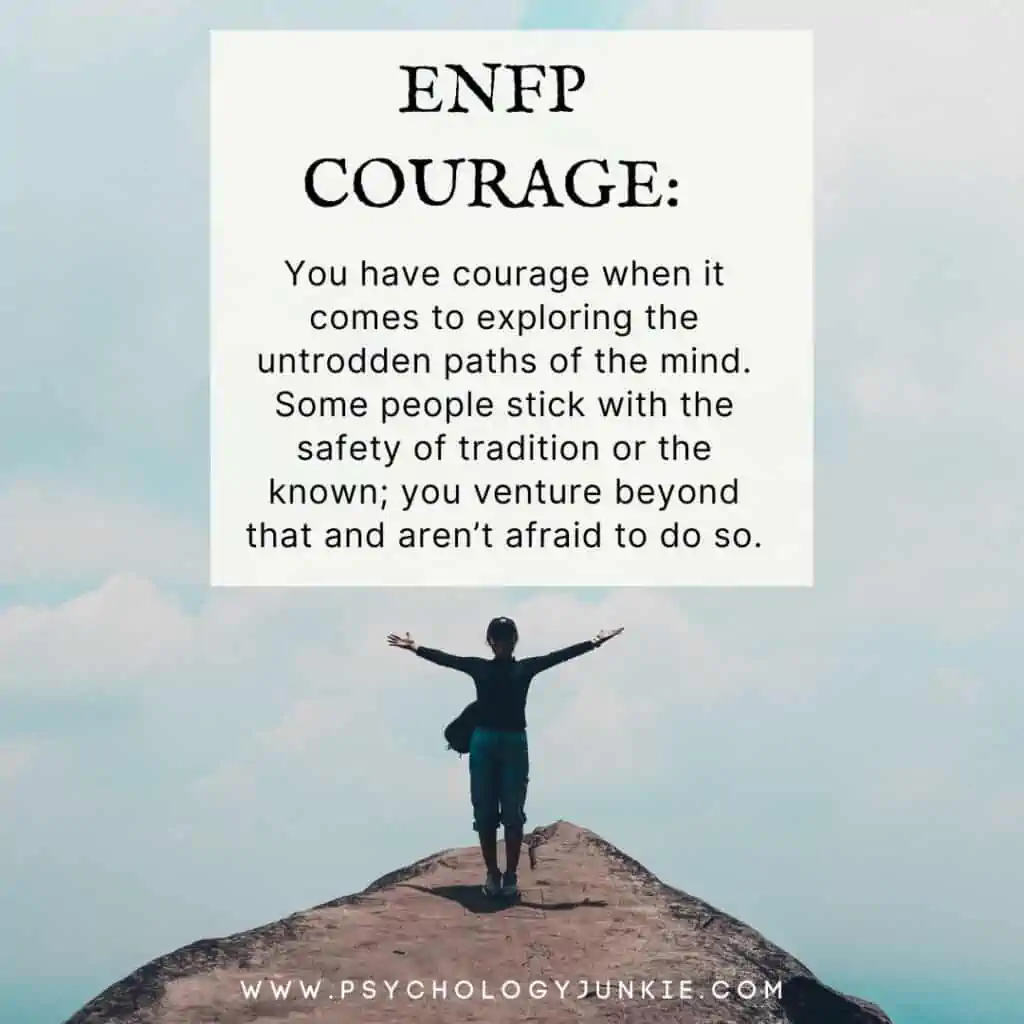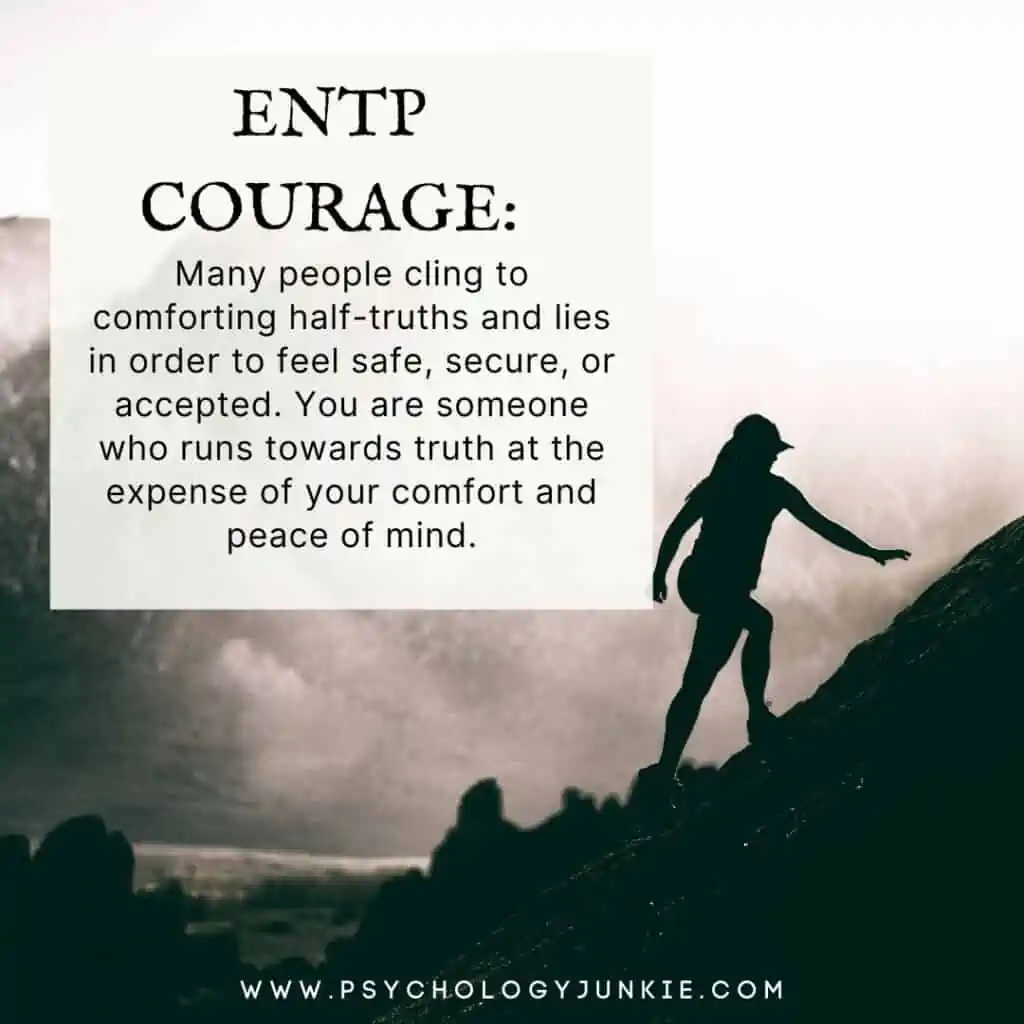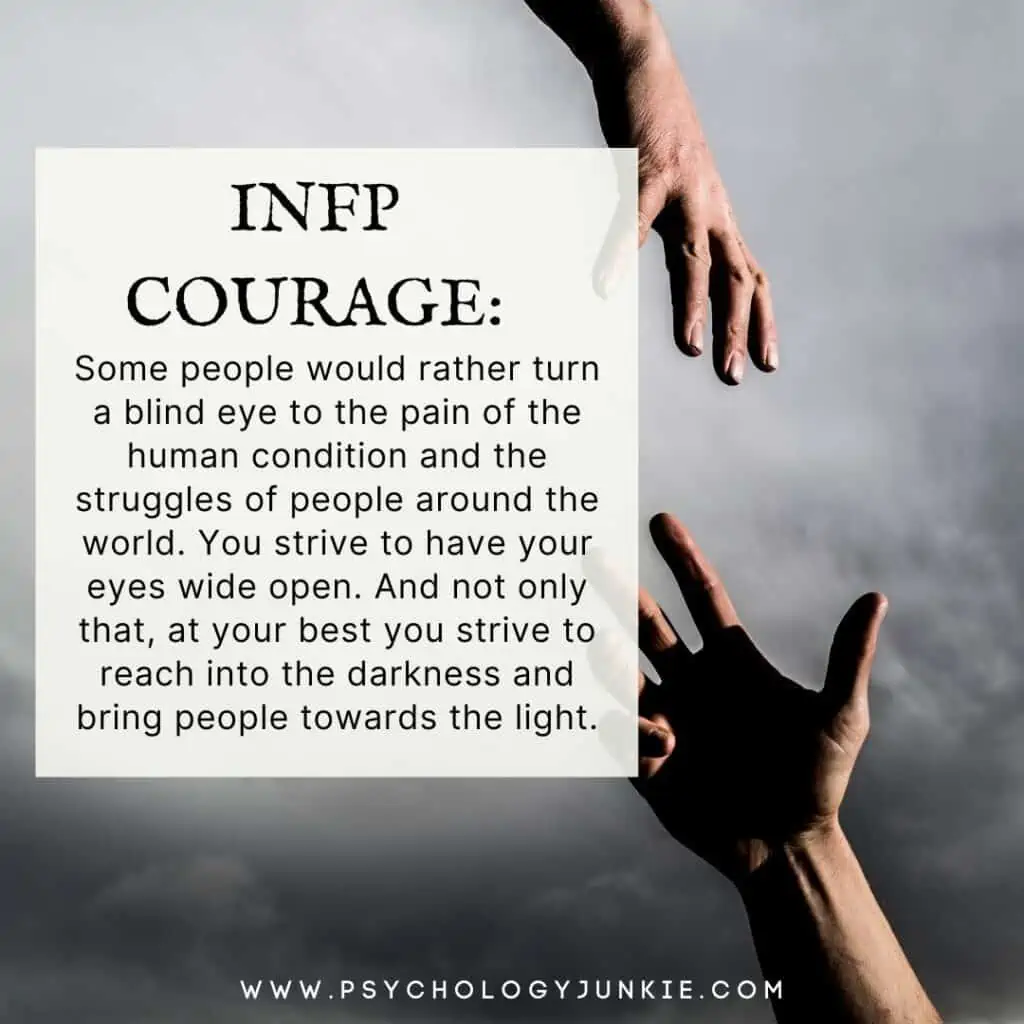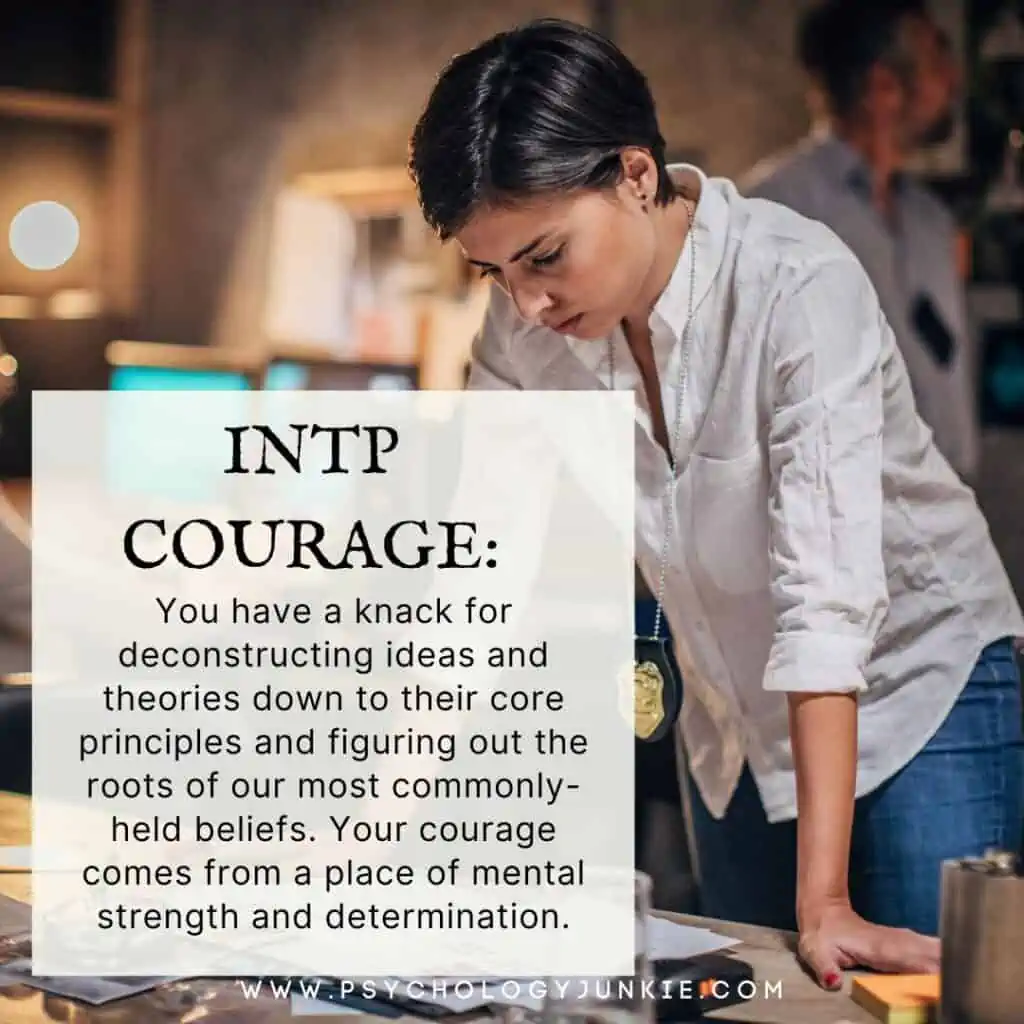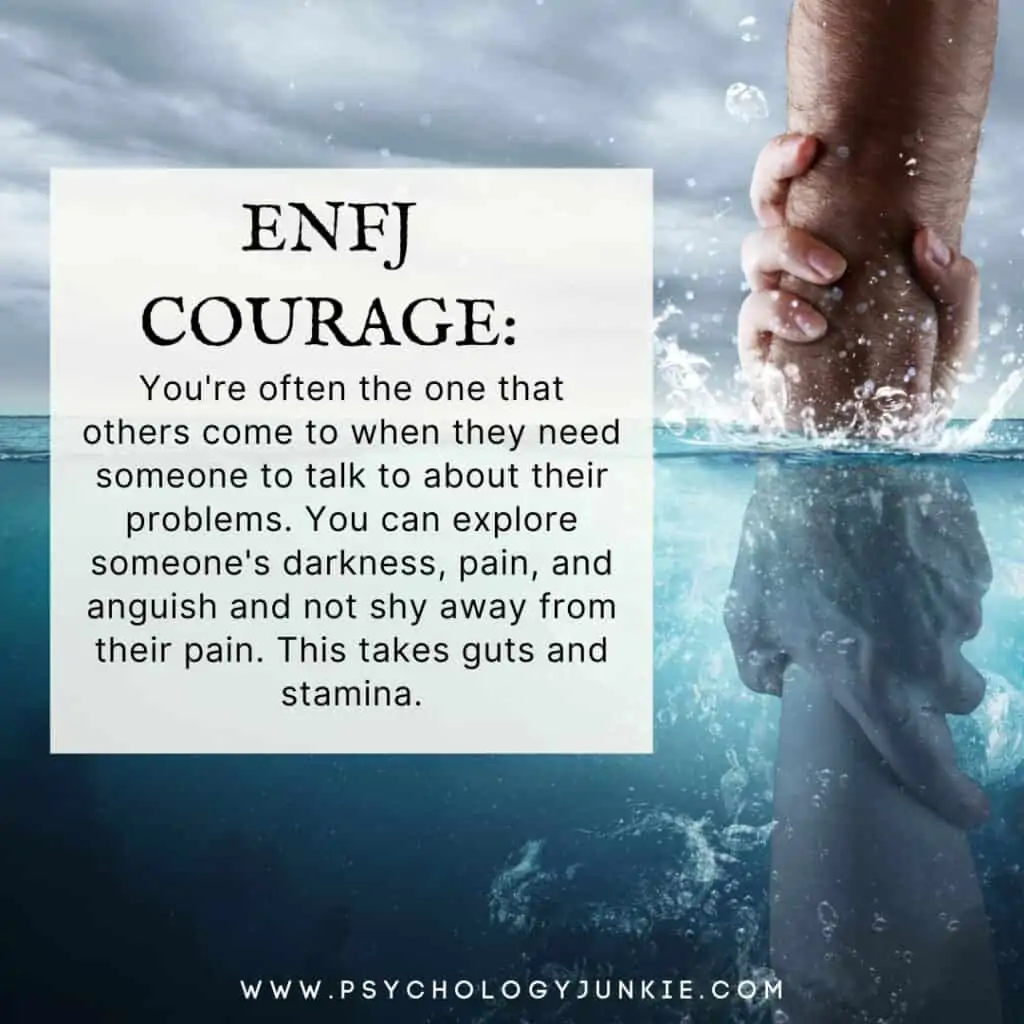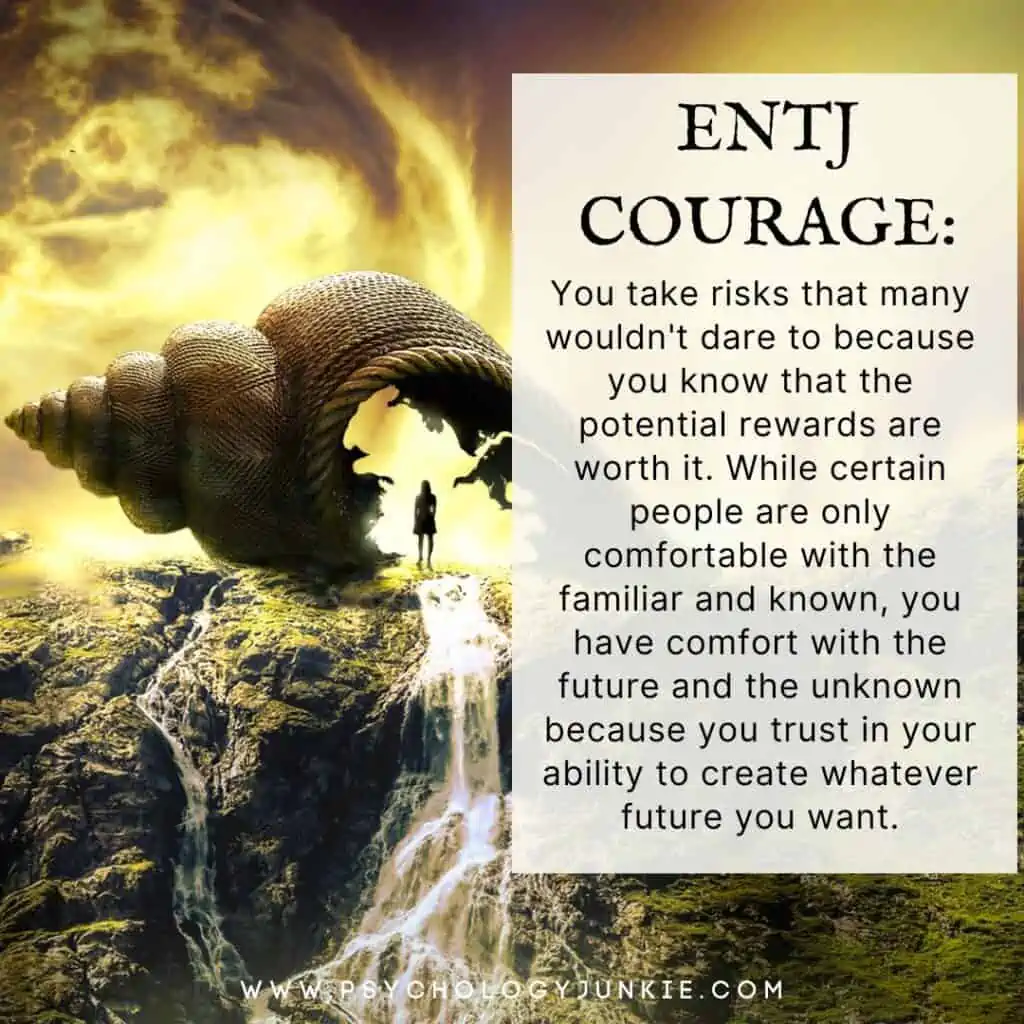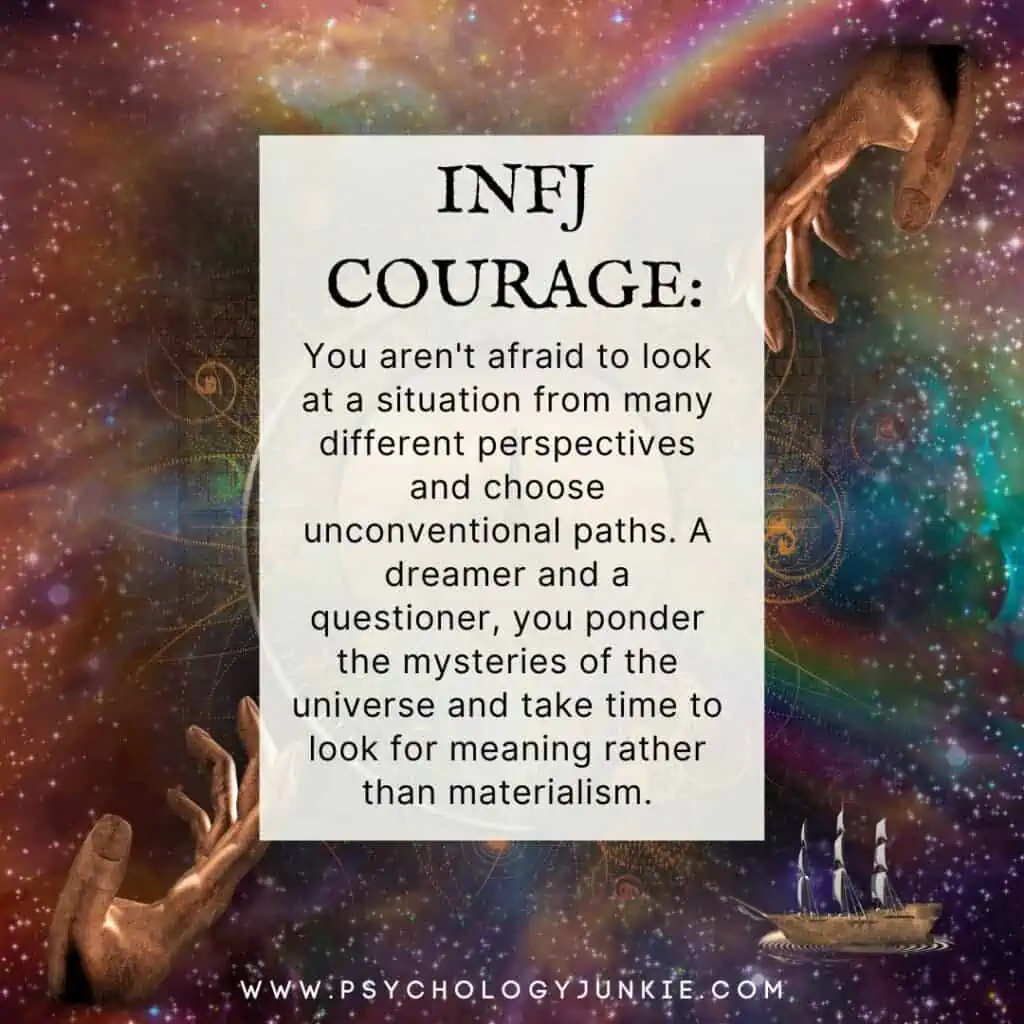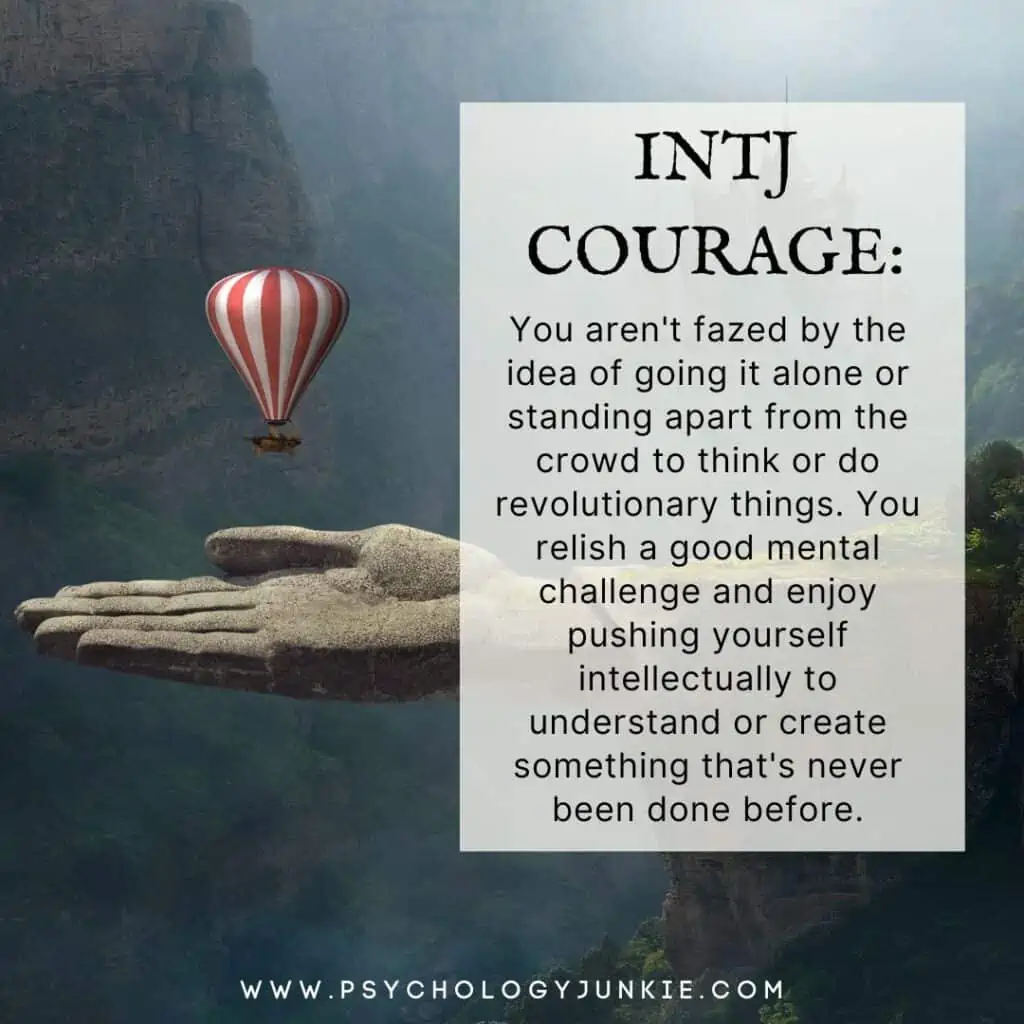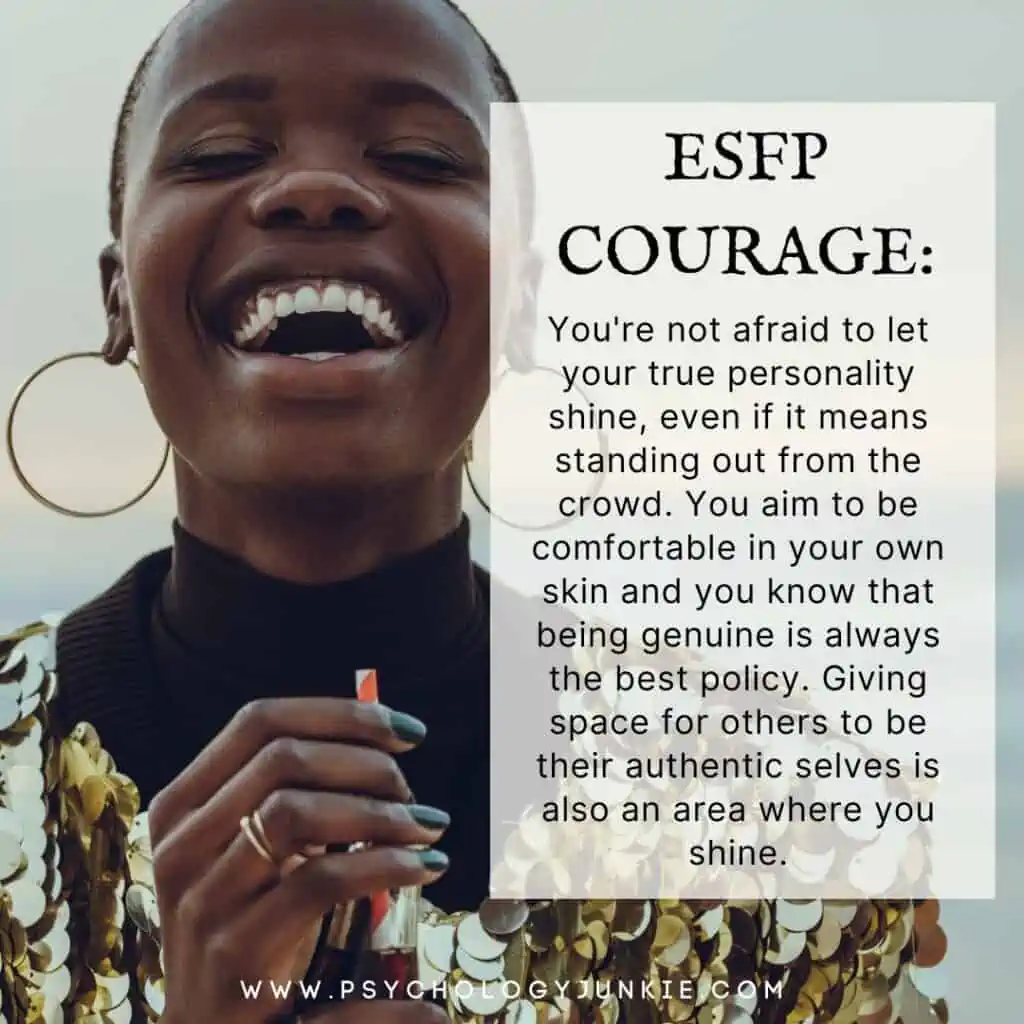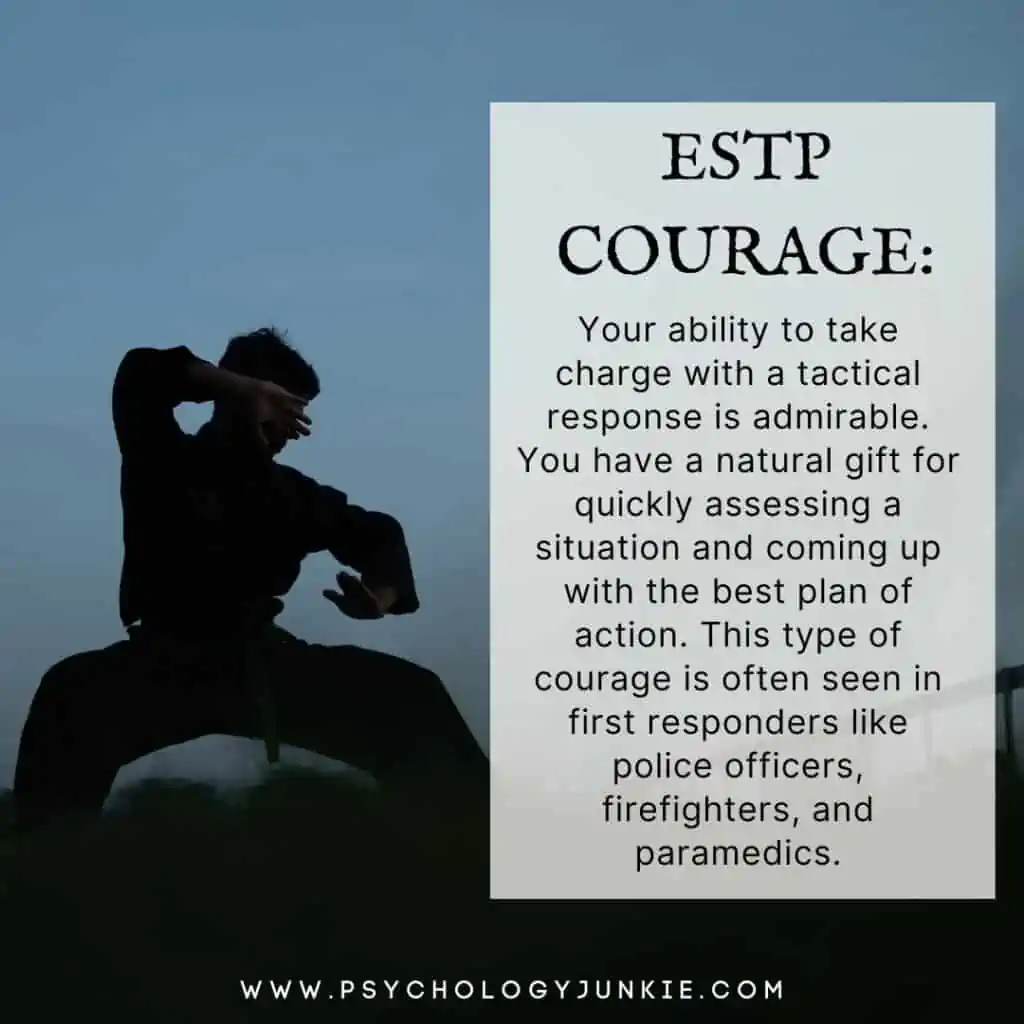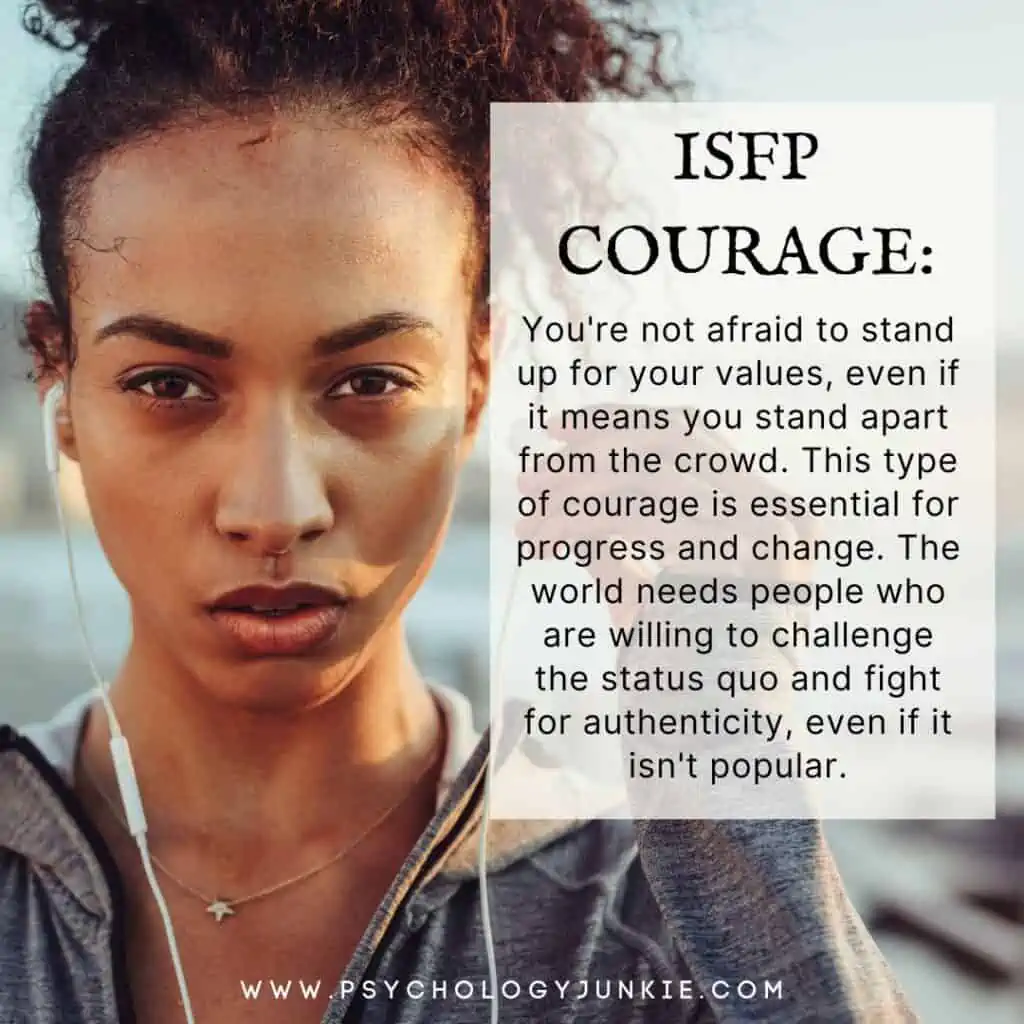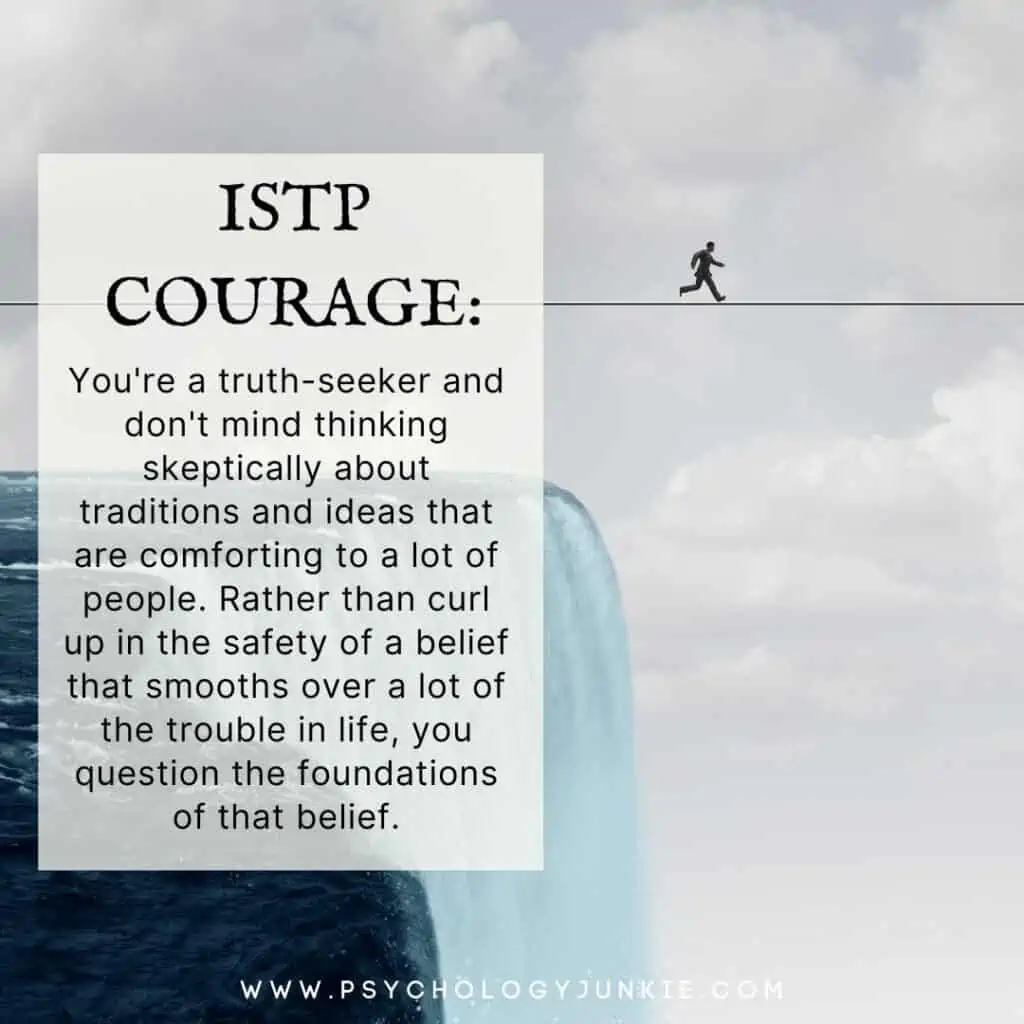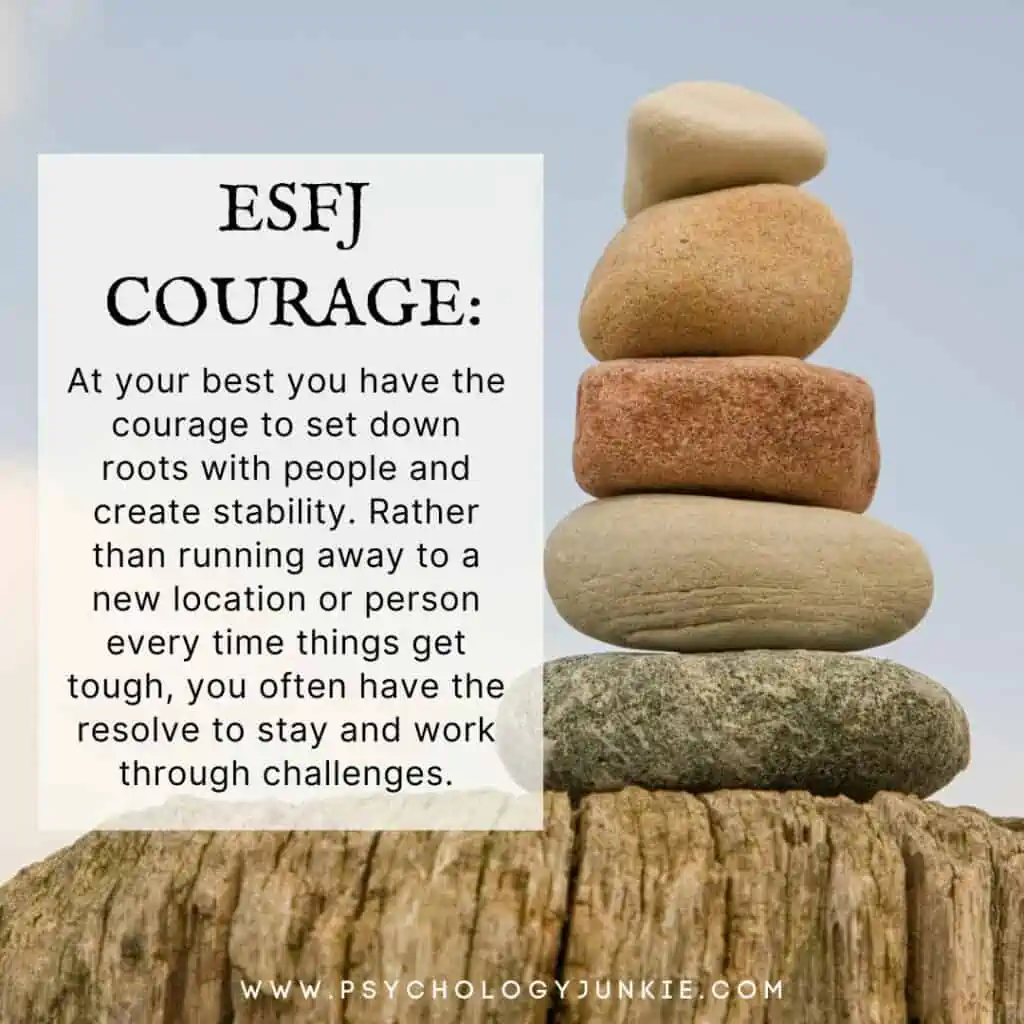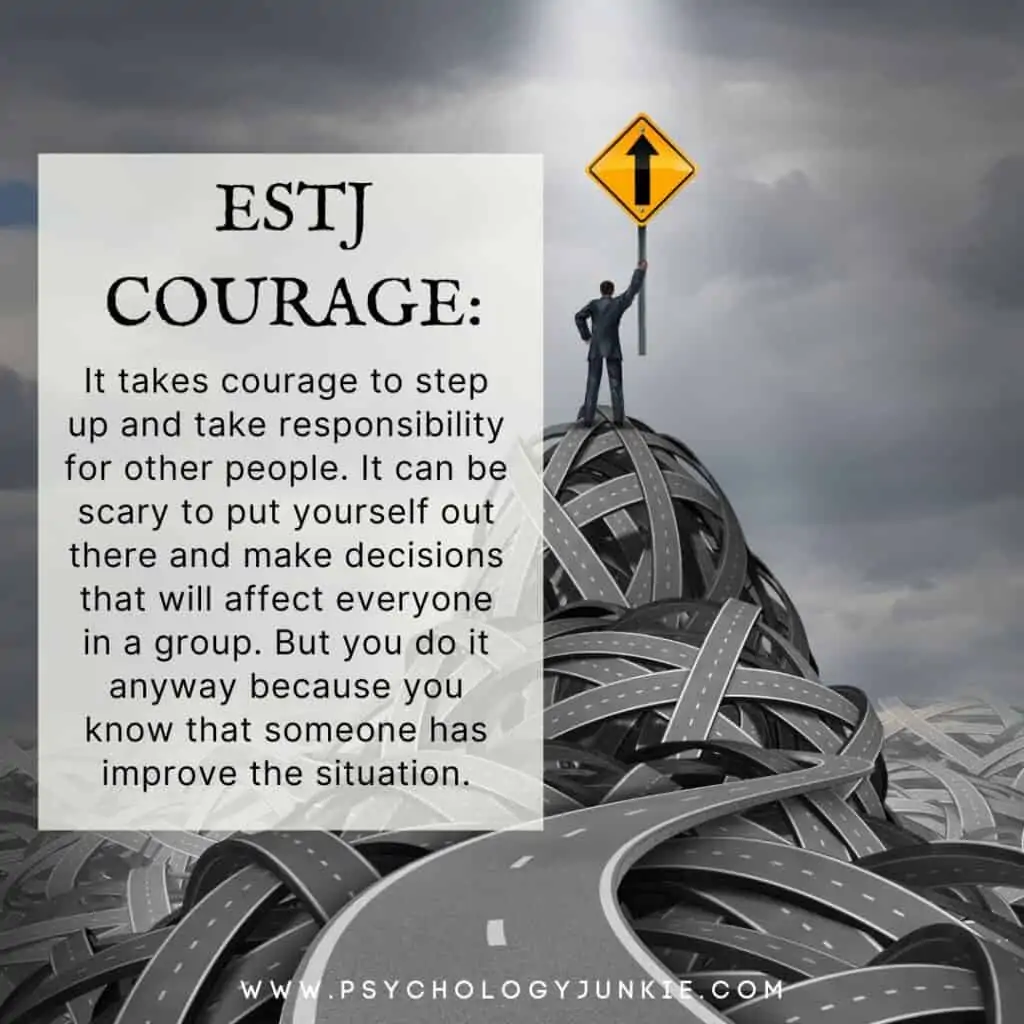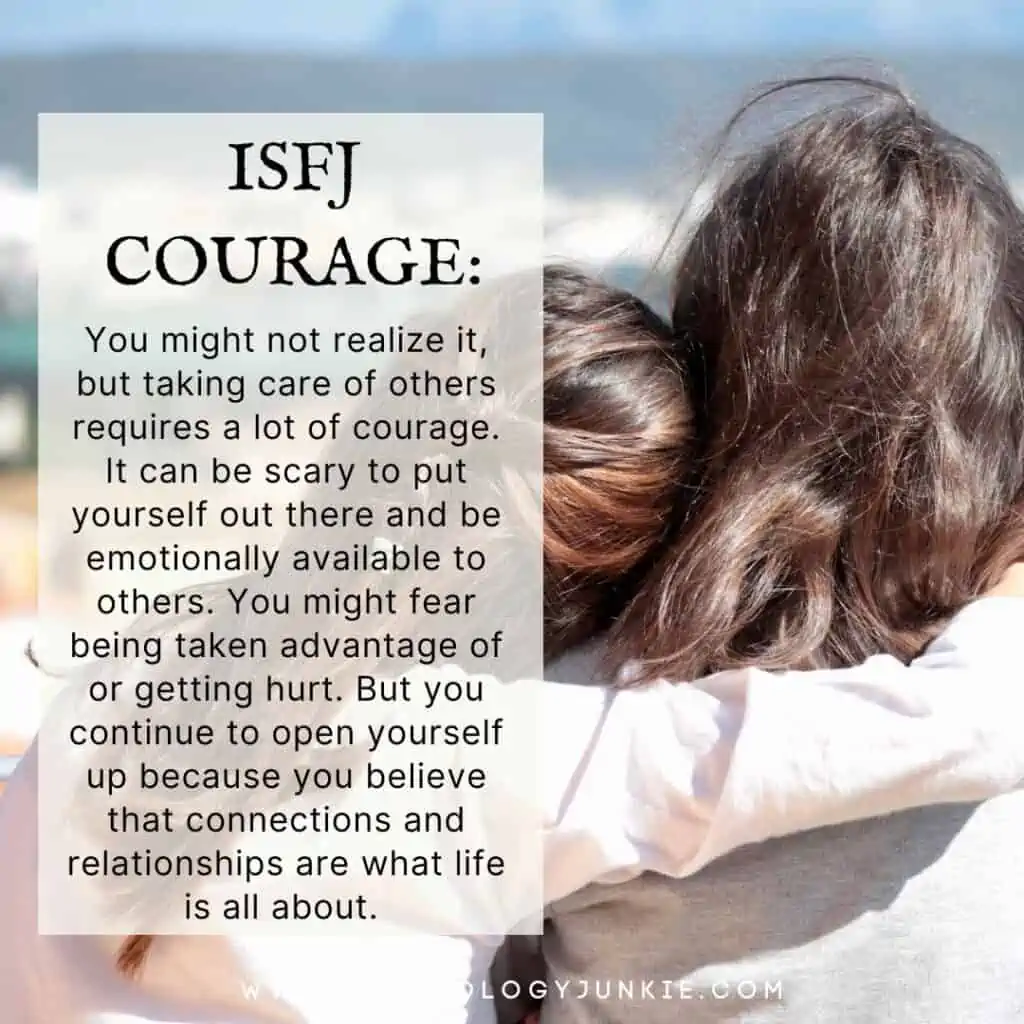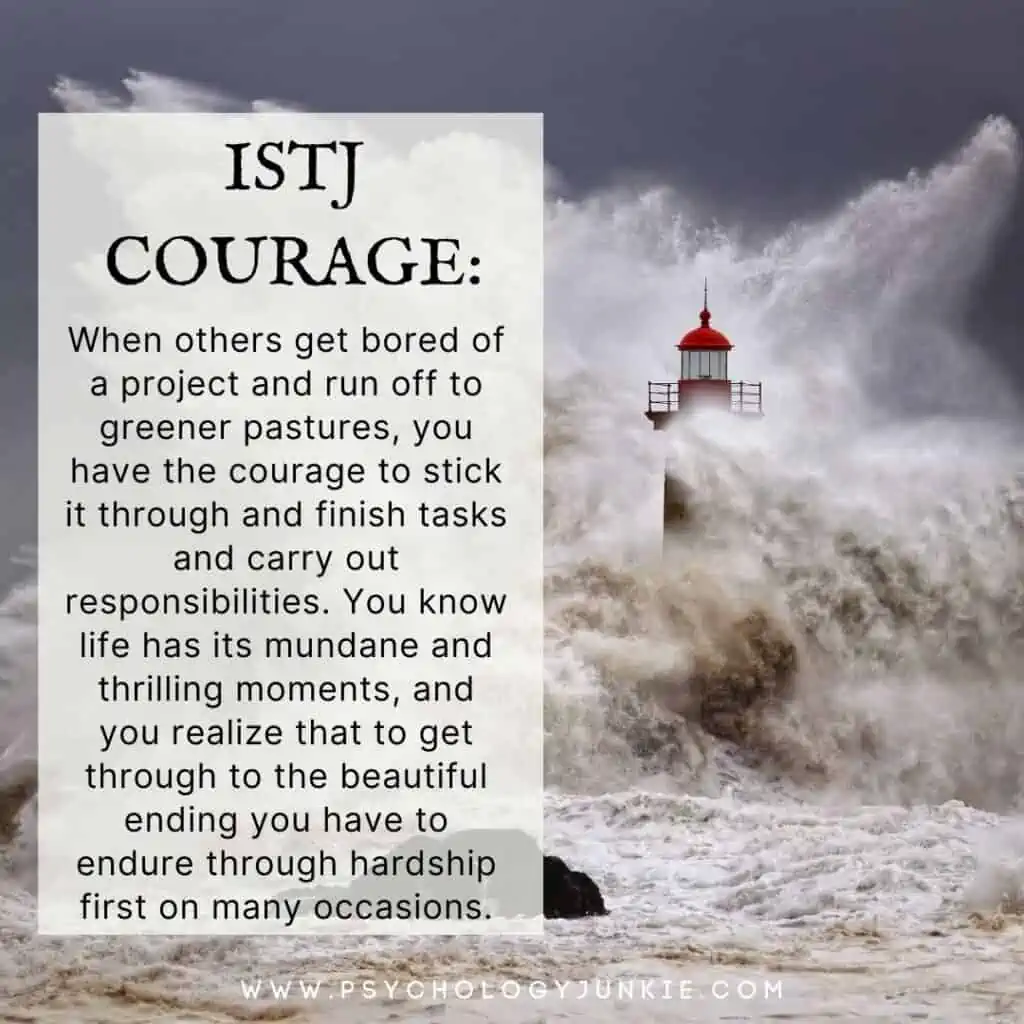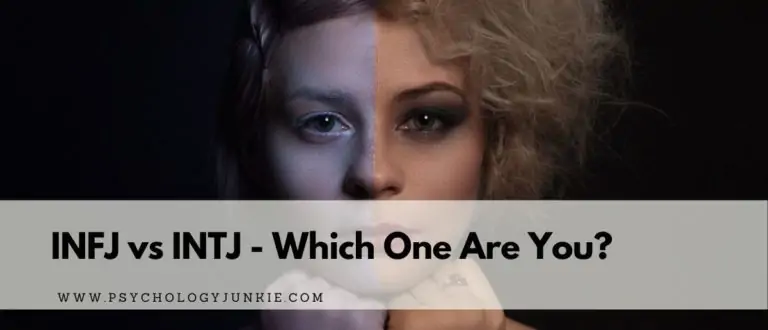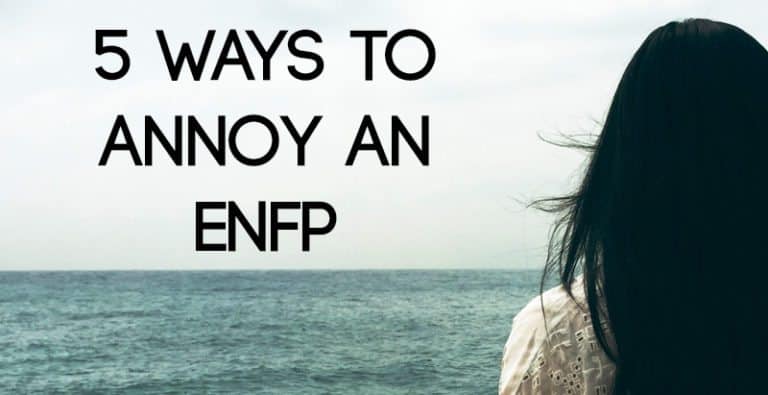How You’re Courageous, Based On Your Myers-Briggs® Personality Type
Do you ever feel like courage is for other people? People with different personality types? People in movies? Depending on where you live or what life circumstances you’ve faced you may or may not have had to build up a lot of courage and resilience in your life. If you’ve had a fairly pampered first-world lifestyle then courage might feel like driving in a new part of town. If you’ve had rougher circumstances, courage might be standing up for your values at threat of great personal pain or safety.
All of us need courage. No great satisfaction or reward comes without the endurance of some form of hardship. Getting to a healthy weight means overcoming the hardship of craving processed foods. Building a business means putting your ideas out there at risk of rejection or failure. Courage is essential for survival and happiness.

But how can we embrace courage more?
How can we value courage more as a society?
That’s what we’ll be exploring in today’s article
How to Embrace Courage, Based On Your Myers-Briggs® Personality Type
The ENFP
You’re someone who enjoys rocking the boat, exploring new ideas, and turning tradition on its head. You have courage when it comes to exploring the untrodden paths of the mind. Some people stick with the safety of tradition or the known; you venture beyond that and aren’t afraid to do so.
In situations that are cataclysmic or chaotic you can be the bravest person in the room. You can mobilize and become active in these situations, throwing out solutions, ideas, and possibilities when everyone else is losing their heads. There’s a comfort in uncertainty that you find solace in while others are running for the exits or the familiarity of the known.
You also have a courage when it comes to self-expression and individualism. You don’t mind going against the grain and aren’t usually afraid to stand up against something you see as unjust or conformist. Even though you’re a feeling type, you don’t mind dealing with conflict if a value is at stake.
How to Embrace More Courage:
While the new and unusual may call to you like a siren song, there’s also value in endurance when life gets monotonous or dull. Sticking to our commitments when they get hard (or boring) takes a different type of courage. You may start a meaningful task only to anxiously look for a distraction when things get mundane or detail-oriented. I urge you to see the value in things that feel mundane in the moment.
The big dreamers of the world still have to do their taxes, go to the dentist, and wash their clothes.
Running away from an idea or dream when it becomes a bit dull is not the way to embrace your courage. The same can be said for running away from relationships when the infatuation phase is over. Some ENFPs are so attracted to the novel and new things of the world that they cut ties when the novelty wears off.
While it’s important to have healthy boundaries, it’s not okay to give up on a dream or relationship just because you’re not in a constant state of infatuation with it/them.
Stick with the boredom for a little while if the boredom will give you a positive or meaningful outcome. Cultivate patience and endurance in order to gain the satisfaction and beauty of a life well-lived.
Read This Next: The Classic Poem You’ll Love, Based On Your Myers-Briggs® Personality Type
The ENTP
You’re someone who will deconstruct any idea or theory and take it apart to find out its roots and logical foundations. Many people are afraid of doing that! Many people cling to comforting half-truths and lies in order to feel safe, secure, or accepted. You are someone who runs towards truth at the expense of your comfort and peace of mind.
In the midst of chaos or unpredictability you also shine. You’re someone who can find a window of opportunity when everyone else sees closed doors and narrowing halls. Finding options in the midst of desolation is something that you have a knack for. Your ability to think outside-the-box and come up with ingenious solutions and possibilities makes you a source of strength when life feels out of control.
You also have courage when it comes to speaking truth and facing potential repercussions. Many people keep their thoughts closely guarded for fear of social rejection. At your best, you give the truth with a sprinkling of empathy thrown in. You are fairly adept at reading people’s emotions and adjusting your message to be both blunt and palatable. But if someone doesn’t agree with you, you’re not afraid to argue for the sake of truth and clarity.
How to Embrace More Courage:
Like the ENFP, you crave newness, novelty, and change. You’re fearless when it comes to exploring new ideas at the risk of leaving the comfort of the known. Yet if you’re unhealthy you can be so attracted to new ideas and change that you forsake the steady, grounded things that would be good for you.
Courage can mean venturing into the unknown. Courage can also mean enduring when the blood, sweat, and tears of life revolve around things that feel mundane. Perhaps you’re trying to finish a project for work and you’re stuck on details that lack room for imagination and exploration. Maybe you want to quit and move onto another project. Maybe being bored and doing mundane tasks gives you a feeling of anxiety. Maybe the courage you need to grow is the kind that comes from persistence in the face of boredom. I’m not saying that you should start and finish all your projects in one go. Take breaks, give yourself bursts of inspiration. But don’t become someone who gives up on every meaningful project because you couldn’t overcome the hurdle of boredom.
Read This Next: 12 Amazing Fictional ENTP Characters
The INFP
Apathy is anathema to you because your entire mindset is focused on bringing your values and ideals to life in some form. While some people find comfort in apathy you strive to feel, really feel, what matters on an intrinsic level.
Some people would rather turn a blind eye to the pain of the human condition and the struggles of people around the world. You strive to have your eyes wide open. And not only that, at your best you strive to reach into the darkness and bring people towards the light.
Courage for you means facing the darkness not only of yourself, but the world, and not being jaded by it. Ultimately what matters in the end? What do you want your life to have stood for? How can you put some form of creative spark into the world that will draw others towards the light of their true being? You have a deep and abiding faith that people have the potential to be good, even when they seem lost in the darkness.
Your courage is also seen in your ability to be emotionally vulnerable with those you trust. It takes a lot of bravery to open up about your feelings and thoughts, especially when you’re used to keeping them close to your chest. But you know that in order to have truly meaningful relationships you need to be able to share the depths of your soul with another person.
How to Embrace More Courage:
As an INFP you value inner harmony and peace. You may detest conflict and criticism, and often withdraw or retaliate in response. Courage can mean taking constructive criticism even when the sting of it feels like it’s going to kill you. You put your heart and soul into your work and the last thing you want is for someone to point out any way that it falls short. But without any form of criticism, we often remain stagnant. So the next time someone offers constructive criticism, try to have the courage to listen with an open mind and heart. However, if the criticism is mean spirited or unwarranted, have the courage to walk away from that person.
When you’re stressed, you can find yourself withdrawing from the world because it seems corrupt and oppressive. While moments and even days of quiet and solitude are good for your soul, try not to overdo it. If you seclude yourself too much then you can become out of touch with the dynamic, intuitive side of your personality and can become less effective. Try to interact with the world in a way that makes you feel refreshed and alive. This could mean joining a book club, attending a painting night at a local art museum, or going for a nature walk with a loved one. Take small steps to get out in the world in meaningful ways so that you don’t increase your anxiety in the long run.
Read This Next: A Look at the INFP Leader
The INTP
You’re someone who is hungry for truth and understanding. Like the ENTP, you’re not afraid to question the status quo and push boundaries. You have a knack for deconstructing ideas and theories down to their core principles and figuring out the roots of our most commonly-held beliefs. Your courage comes from a place of mental strength and determination.
As an INTP, you’re not afraid to be alone with your thoughts because you know that this is when you do your best thinking. In fact, you often prefer to be alone because you find social interaction draining. There’s a side of you that often feels like it has to pretend around others; to be socially appropriate rather than the rebellious skeptic that you are at heart. You need to be able to discuss deep, meaningful ideas in order to feel truly connected to someone.
People count on your courage when they are facing the unknown or complex. While some people feel anxious and restless when left with their own minds and a complex problem, you feel alive. You are energized by taking on challenging problems and technical puzzles and have the patience to find the best solutions.
How to Embrace More Courage:
You’re more than brave when it comes to exploring new ideas and testing the foundations of your core beliefs and ideas. You could spend days theorizing and analyzing while others’ patience for such things would wane after only a few minutes. For you courage can be improved when you get out into the world and test your ideas through experimentation and real-world experience. You might worry that events will turn out poorly, that you’ll have to deal with annoying people, or that you’ll lose your focus. It can be easy to get stuck in the role of “armchair expert” rather than real-world expert.
I would challenge you to put your ideas and theories to the test in the real world. Or simply get out and try new things that broaden your experience-database and, thereby, your foundations of thinking. Join an improv class, drive without an agenda, go camping on your own with only the survival skills you’ve learned, or try bantering with someone and brainstorming without worrying about how you’ll be interpreted! If it doesn’t go well, think about the experience (without beating yourself up) and figure out what useful information can be gathered from that. All experiences, even failed ones, can teach us something if we’re open to the lesson.
Read This Next: Are You an INTP or an INTJ? 7 Ways to Tell Them Apart
The ENFJ
You possess a unique brand of courage that is based on your idealism, compassion, and your visionary insight into others. While some people shy away from emotional intimacy and difficult conversations, you excel in these areas. You have a gift for understanding people and seeing the best in them even when they can’t see it in themselves. You’re often the one that others come to when they need someone to talk to about their problems. You can explore someone’s darkness, pain, and anguish and not shy away from their pain. This takes guts and stamina.
It can be easy to see the world for all its problems and all its corruption. But while you get powerful insights into what’s likely to happen, you use those insights to achieve goals and help others. You want to change the trajectory of the world for the better by seeing the world’s patterns and putting your personal stamp of helpfulness and empathy on them. You can often sense a person’s potential, their path, and their character with great clarity. You use this to coach and guide others gently but firmly towards their best possible future.
How to Embrace More Courage:
You tend to put others’ needs before your own which can sometimes result in you neglecting your own well-being. I would encourage you to set boundaries with the people in your life and make sure that you’re taking care of yourself both physically and emotionally. It can be easy to get lost in other people’s problems and emotions and forget about your own. When you’re depleted, you don’t have anything left to give to others. Make sure that you’re taking the time to refuel so that you can continue being the amazing support system that you are. Sometimes this means having the courage to say “no” and risk disappointing others.
Another area that is crucial to explore is a certain comfort with disharmony. You want to improve the mood and bring your environment to a place of harmonious accord. But sometimes conflict, disagreement, and blunt interactions are what’s needed in order to get to a place of true resolution and intimacy. Be brave enough to have those difficult conversations and trust that you can handle the discomfort that may come with it. It will be worth it in the long run. And be okay letting other people sit in their negative emotions at times. If you try to fix everyone’s feelings all the time you may rob them of the opportunity to process and grow from their emotions. This could mean letting your teenage child be angry at a rule you made (without altering it). It could mean saying no to someone asking for help because this person has continually taken advantage of you or you need some time for yourself. It could mean speaking the hard truth without smoothing it over, because you know that’s what someone needs to hear.
Read This Next: 7 Ways That ENFJs Make an Impact
The ENTJ
You’re someone who sees past roadblocks and difficulties to a future vision you want to realize in the real world. Your ambition is boundless and your stamina for hard work is impressive. You take risks that many wouldn’t dare to because you know that the potential rewards are worth it. While certain people are only comfortable with the familiar and known, you have comfort with the future and the unknown because you trust in your ability to create whatever future you want. You’re a natural leader and often times people are drawn to your strength, decisiveness, and clear vision.
You also have courage when it comes to speaking bold truths. You may be in a room where everyone strongly disagrees with you about something, but you don’t mind speaking your truth because you know it’s authentic and you’ve thought it through logically. You’re not afraid of ruffling feathers or stirring up trouble if it means getting closer to the truth. In fact, you often find conflict and debate exhilarating because it allows you to put your sharp mind to work and flex your analytical muscles. And at times it gives you the opportunity to defend values that are deeply important to you.
How to Embrace More Courage:
You can speak boldly to promote your ambitious ideas or to defend your logic, but sometimes you shy away from sitting and existing in the world without accomplishing something or striving. Yes, many people shy away from striving (and those people probably annoy you). But sometimes you strive so much that you are uncomfortable with stillness. This can mean you work relentlessly but you don’t know yourself well or you have a hard time taking breaks. It can also mean you’re always trying to fix things or improve your relationships but you never feel like they’re good enough.
One way to explore more courage is to be okay with not knowing everything and not having all the answers. It can mean allowing yourself to just “be” without needing to finish anything. This can be a difficult task for you because you’re so used to taking action and seeing results. But if you can find comfort in the unknown and just sit with yourself (and your thoughts) for a while, it can be incredibly healing and restorative. It can also help you to get better in touch with who you are, your values, and the patterns that give you insights. If you find yourself experiencing uncomfortable emotions, see if you can just sit with them for a while instead of trying to fix them or make them go away. Practice deep breathing as you process these feelings. These emotions are often messengers telling you something important about yourself or your life.
Read This Next: Here’s the Influential Woman in History Who Has Your Myers-Briggs® Personality Type
The INFJ
As an INFJ you understand that to improve the world sometimes radical steps have to be taken. Though you may be seen as mysterious or even “odd” by others, your ability to see beyond the surface and spot patterns and possibilities gives you a unique visionary perspective. You aren’t afraid to look at a situation from many different perspectives and choose unconventional paths. A dreamer and a questioner, you ponder the mysteries of the universe and take time to look for meaning rather than materialism. Some questions have no answers (yet), but you don’t mind exploring these questions anyway – even if it means you devote your life to mysteries that no one has solved yet.
INFJs also have courage when it comes to understanding people. You aren’t afraid to explore someone’s pain, grief, or vulnerability in order to help them heal. Your ability to see and empathize with both the good and bad in people means you’re often able to offer deep insight and compassion. This can be a difficult thing for others to handle because it’s not always comfortable to have someone see our shadows. But for you, it’s worth it if it means helping someone else grow.
How to Embrace More Courage:
For INFJs, the bravery to explore the unknown and to entertain philosophies and mysteries that haven’t been solved yet is something to be celebrated. But you can sometimes kick experiencing the “now” down the road indefinitely. This can mean that eventually you look back on your life and wish you’d “stopped to smell the roses” more or risked more to bring your ideas into reality. For an INFJ, sometimes being brave means testing your creative ideas in the real world, even if they might fail. It means putting action to your insights instead of overanalyzing them to death. Sometimes it simply means speaking your mind, even if you fear that you’ll be misunderstood.
INFJs can also work on embracing more courage when it comes to self-compassion. People with your personality type tend tend to be very hard on themselves, beating themselves up for their mistakes or for not living up to their own high standards. But if you can learn to forgive yourself and treat yourself with the same compassion you typically give to others, it can be a game-changer. The more you accept and love yourself, the more you’ll be able to be resilient with the hurdles life throws your way. This can mean setting healthy boundaries or saying “no” when you’re worried about the repercussions.
Read This Next: 12 Amazing Fictional INFJ Characters
The INTJ
Private and independent, you live according to a unique mental roadmap you’ve been creating since childhood. You’re dauntless in pursuit of your goals and visions and not afraid to tackle any obstacle in your way. This doesn’t mean you don’t have any fears, but it does mean you’re more likely to face them head-on rather than avoid them. You aren’t fazed by the idea of going it alone or standing apart from the crowd to think or do revolutionary things. You relish a good mental challenge and enjoy pushing yourself intellectually to understand or create something that’s never been done before.
Many INTJs also have the courage to be honest, even when it’s difficult or unpopular. You value truth and the scientific method, and you’re not afraid to point out when someone is wrong or misguided – even if that person is in a position of power. That said, you also enjoy new insights and don’t mind testing a new theory even if it doesn’t align with previous traditionally-accepted studies. The courage to switch gears when the logic doesn’t add up is something you embrace fully.
How to Embrace More Courage:
INTJs can work on embracing more courage when it comes to getting out in the real world and taking on new experiences. While you love taking on a new mental challenge, sometimes you forego tangible, physical experiences in favor of intellectual ones. Sometimes courage means doing something that gets you in touch with your body in the present moment. This could be as simple as driving in a new city or as challenging as joining a theater group and performing on stage! While you’ll get the most energy from putting your own intuitive stamp on every action you take, incorporating action and experience with your revolutionary ideas can make them all the more powerful.
You might also need to embrace more courage when it comes to socializing and networking. INTJs are notoriously independent and don’t always see the value in building relationships with others. But sometimes these connections are key to achieving your goals, whether it’s for business or personal reasons. Putting yourself out there and engaging with others, even if it’s not your favorite thing to do, can pay off in big ways.
Read This Next: Here’s the U.S. President with Your Myers-Briggs® Personality Type
The ESFP
Motivated and energetic, you have an infectious energy and drive to experience life to the fullest. The quote “Seize the day!” is probably your life motto. You’re not afraid of taking risks, whether it means moving somewhere new or trying your hand at improv comedy. You view life as one big adventure, and you want to make the most of every moment. The courage to grab life by the horns and go for it is one of your greatest gifts.
ESFPs are also incredibly brave when it comes to being their authentic selves. You’re not afraid to let your true personality shine, even if it means standing out from the crowd. You aim to be comfortable in your own skin and you know that being genuine is always the best policy. Giving space for others to be their authentic selves is also an area where you shine. It isn’t always easy to be different, and because of that, you empathize with the misfits and oddballs of the world and want to invite them to your circle so they don’t feel alone. People are drawn to your warm, openhearted nature, and you’re usually game for making new friends.
How to Embrace More Courage:
You may be the first to go on an impromptu road trip or pack up your house and live full-time in an RV, but sometimes courage means saying no to the new adventure and staying put. That doesn’t mean your life has to be boring – far from it! You can find courage in everyday moments and experiences by being fully present and engaged with what you’re doing. This could be as simple as savoring your favorite food or enjoying a sunset.
Take time to get into your values; What matters to you? What is worth being “bored for? What personal ethics are worth sacrificing the fun of the moment for? How can you embrace these values and stand up for them while still having fun? This could be as intense as attending a political rally for a cause you believe in or as relaxed as walking dogs for an animal shelter!
You can also become more courageous by embracing constructive criticism. This doesn’t mean tolerating rude comments or personal attacks, but it does mean being open to hearing feedback from others, even if it’s not what you want to hear. It can be painful to have our flaws pointed out, but this type of courage can help us grow and become better people. Just make sure you’re getting criticism from people you trust and admire. This can be as simple as asking advice before you make your next big life decision or asking someone’s honest opinion on an area you need improvement on.
Read This Next: ESFP or ENFP – Which One Are You?
The ESTP
In a crisis situation you’re often the first person people look to for help. Your ability to take charge with a tactical response is admirable. You have a natural gift for quickly assessing a situation and coming up with the best plan of action. This type of courage is often seen in first responders like police officers, firefighters, and paramedics. But it’s also seen in ESTPs who step up to lead their team at work or take care of their loved ones when times are tough.
You’re also very brave when it comes to speaking your mind. You’re not afraid to voice your thoughts, even if they differ from the majority. You believe in standing up for rational thinking and critical analysis, even if it means going against the grain. This type of courage is essential for progress and change. The world needs people who are willing to challenge the status quo and fight for truth, even if it rubs the masses the wrong way.
ESTPs are also courageous in their willingness to take risks. You’re not afraid to put yourself out there, whether it’s trying a new hobby or asking someone out on a date. You know that life is too short to play it safe all the time. And while you may not always succeed, you’re always willing to give it your best shot.
How to Embrace More Courage:
While you think fast in a crisis, you can run away from situations that seem like they might “trap” you or be mundane. You have a thirst for action and adventure and sometimes this means you get restless and bail on projects once the “honeymoon phase” is over. The key for you is to find ways to keep your life interesting and exciting, even when you’re not constantly on the go. This could be as simple as trying new things, like a new strategy game or a photography class. It could also mean committing to a long-term goal, like starting your own business or training for a marathon. When you find yourself getting restless or bored, ask yourself what would make you proud to look back on this time in your life. What would be worth sticking with even when it’s tough?
You can also work on being more courageous in your relationships. You’re often charismatic and charming, but you may not be as open with the people you’re closest to. You may not share your deepest thoughts and feelings with others, for fear of being judged or rejected. But the people who love you the most are also the people who will accept you for who you are, flaws and all. So don’t be afraid to let your guard down and be vulnerable with the people you care about. It takes courage to do this, but it’s worth it.
Read This Next: The Shadow of the ESTP Personality Type
The ISFP
ISFPs are often quiet and introspective, but people shouldn’t underestimate you. You’re actually quite courageous, even if it’s in a more subtle way. You’re not afraid to stand up for your values, even if it means you stand apart from the crowd. This type of courage is essential for progress and change. The world needs people who are willing to challenge the status quo and fight for authenticity, even if it isn’t popular.
While some people get their sense of right and wrong from the world around them, you ask yourself “Why?” and go deeper. This type of courage to search your inner world, uncover your motivations, and figure out the good and bad of you in all its detail is the root of your unique courage. You need to understand your wants and needs, values and morals before you can act on them. This deep-dive soul-searching allows you to understand the human condition and the struggles of others in a unique and powerful way. This requires a lot of introspection and self-awareness. It’s not always easy, but it’s worth it.
You’re also very brave when it comes to your creative pursuits. Whether you’re singing a deeply personal song or crafting rebellious or shocking art, you’re not afraid to go against the grain and be non-conformist. You know that art is about expression and honesty, not pandering to the masses.
How to Embrace More Courage:
ISFPs can be shy and reserved, so one way to embrace more courage is to push yourself outside of your comfort zone. This could mean trying new things, meeting new people, or speaking up more often. It’s okay to be introverted and quiet, but don’t let it hold you back from living your life fully. Show the world that even the quiet ones have bold and brilliant ideas.
If you’re a one-sided ISFP this means that you’re deeply in touch with your feeling side but dismissive of your thinking side. This can mean that you reject constructive criticism and can believe in things because your gut tells you to, without critically questioning the roots of your beliefs. If you find yourself being too idealistic or closed-minded, try to engage your thinking side more. This could mean reading books that challenge your beliefs, talking to people with different worldviews, or reflecting on constructive criticism before retaliating or shutting someone out.
Read This Next: ISFPs, INFPs and Empathic Mirroring
The ISTP
You have a knack for adapting in the moment and handling chaotic situations with a calm intensity and focus. You can remove yourself from a situation in order to think objectively, seeing the truth of what’s happening and the best way to deal with it. This type of courage is essential in times of crisis, when quick thinking and decisiveness is needed.
You’re also a truth-seeker and don’t mind thinking skeptically about traditions and ideas that are comforting to a lot of people. Rather than curl up in the safety of a belief that smooths over a lot of the trouble in life, you question the foundations of that belief. You see logical inconsistencies quickly and refuse to snuggle up with pretty half-truths.
You’re also very brave when it comes to your physical pursuits. You’re not afraid of adventure or danger, and you thoroughly enjoy a mental or physical challenge. You get a thrill from pushing your limits and testing your skills. This type of courage is about more than just physical strength – it’s also about mental and emotional strength. It takes a lot of guts to put yourself in potentially dangerous situations, but you’re not afraid to do it. That said, you’re not reckless about it. You think quickly and underneath your quiet exterior is a barrage of mental analysis. You find leverage points and potential weaknesses in order to minimize risk and be effective.
How to Embrace More Courage:
As an ISTP you gain a lot of energy by doing things your own way and in your own time. You crave autonomy and freedom and that’s one of the things that makes you so courageous. But sometimes this can also make you a bit of a lone wolf. You don’t always need other people, but that doesn’t mean you shouldn’t let them in sometimes. Try to be more open with the people you care about. Share your thoughts and feelings with them, even if it’s hard for you to do. It will make you closer to them and also help you to feel more connected to the world around you.
If you’re a one-sided ISTP you can get stuck in analysis-paralysis, searching for truth, but not believing in anything or anyone. You hate being wrong and will argue relentlessly against anyone who disagrees with you, feeling the need to convince them that you’re right. This can make you seem close-minded. Try to breathe deeply, relax your body, and accept that there are multiple truths out there. There’s not one “right” answer for every situation. And sometimes it’s okay to be wrong. It doesn’t make you weak or stupid, it just means that you’re human. At your best, you can enjoy activities that are purely for enjoyment, without needing to constantly analyze them. You can be spontaneous and adaptable. You can also let yourself be vulnerable with the people you trust.
Read This Next: Understanding ISTP Thinking
The ESFJ
You are often the glue that holds families, communities, and groups together. While some might look at this and see someone who is friendly, warm, and unity-minded, there’s a lot of courage under the surface. It takes bravery to reach out to people and to step into their shoes. It takes guts sometimes to step out the door and meet people where they’re at and try to bring them together. It takes strength to be a peacemaker and a unifier. Bringing people together on a frequent basis means that you’re frequently confronted with people’s shadows, struggles, and grief. It can be difficult to deal with all of that on a regular basis, but (for a healthy ESFJ) it comes naturally.
At your best you have the courage to set down roots with people and create stability. Rather than running away to a new location or person every time things get tough, you often have the resolve to stay and work through challenges. At your best you’re not afraid of emotional intimacy or vulnerability, because you know that these things are essential for a meaningful connection.
How to Embrace More Courage:
You enjoy unity and connection. Nothing makes you feel better than the spark of harmony when you’re laughing with a friend or helping someone in need. But sometimes disharmony can be just as powerful. Embracing healthy conflict can help you to stand up for yourself when it matters and assert boundaries without becoming a doormat. For someone who loves harmony and connection, embracing healthy conflict can be intimidating and off-putting. But when done right, conflict can create more intimacy and honesty in relationships.
Conflict can also arise from the inside. As an extrovert you enjoy socializing and often seek out a friend when life gets rough. If that opportunity isn’t available sometimes it can lead to unhealthy habits. When you’re feeling disconnected or alone, it can be tempting to numb yourself with food, TV, or social media. But instead of numbing yourself, try to embrace the discomfort. It might not feel good at first, but it can lead to a more authentic and intimate connection with yourself and others.
You Might Also Enjoy This Article: Understanding ESFJ Feeling
The ESTJ
ESTJs tend to naturally take charge of situations and set guidelines and roadmaps. You’re often the one who steps up and rallies people together to get a job done. But being a leader doesn’t mean that you’re never afraid. It takes courage to step up and take responsibility for other people. It can be scary to put yourself out there and make decisions that will affect everyone in a group. But you do it anyway because you know that someone has to improve the situation. And you’re often able to cut past the clutter and emotion and see clear steps forward.
At your best you’re a confident leader who knows how to get things done. You’re not afraid to make tough decisions and you have the courage to stand by your convictions even when others disagree with you. You’re able to take charge and organize your environment for maximum efficiency. You know that being the one in charge can be lonely. After all, if things go wrong you’ll be the one who gets the blame. But you know that the risk is worth it.
How to Embrace More Courage:
You tend to be a confident leader, but there are always areas in which you can grow. One area is in embracing your vulnerability. Many ESTJs want to appear invulnerable and tough, but sometimes courage comes in the form of admitting that you don’t have all the answers. It’s okay to be fallible and it’s okay to need help. Asking for help doesn’t make you weak, it makes you human. Admitting your mistakes is also a sign of strength. It shows that you’re willing to learn and grow from your experiences.
Another way to embrace more courage is to allow yourself to be challenged. You have firm beliefs about the “right way” to do things. And many times your beliefs are grounded in facts and life experience. But sometimes people come along who challenge your beliefs, traditions, and routines. Instead of immediately doubling-down on your position, what could you learn from them? Are there any elements of truth or possibility in their perspective? Open yourself up to other perspectives and ways of doing things now and then so that you don’t become narrow-minded or stuck in a rut.
The ISFJ
ISFJs are attentive and nurturing people who often put the needs of others above their own. You’re often the ones who remember birthdays, send cards, and do kind deeds without being asked. You tend to put your own desires on the back burner in order to take care of those around you. This can be a difficult thing to do, but you get real joy from providing help and practical assistance to others.
You might not realize it, but taking care of others requires a lot of courage. It can be scary to put yourself out there and be emotionally available to others. You might fear being taken advantage of or getting hurt. But you continue to open yourself up because you believe that connections and relationships are what life is all about. It also takes courage to pay attention to other people; all their pain, imperfections, and flaws. It would be much easier to ignore it all, but you don’t because you know that meaningful relationships are one of the reason’s you’re here on this earth.
You also have bravery when it comes to defending traditions and values that the world in all its chaos may start to attack or belittle. You trust your experiences and have a grounded, fact-based approach to life. While you can be kind to people you disagree with, you have the courage to stand on the truths you know even when everyone is embracing a new, fanciful idea that’s not based on reality.
How to Embrace More Courage:
One way to embrace more courage is to learn to take care of yourself. This doesn’t mean that you should stop taking care of others, but it does mean that you need to put your own oxygen mask on first. Make sure that you’re getting enough rest, eating healthy meals, and taking time for yourself. It’s also important to set boundaries. You don’t have to say yes to every request that you receive. It’s okay to put your own needs first sometimes. It can feel weird and scary at first, but it’s vital for your own well-being.
Another way to embrace more courage is to try new things. One-sided ISFJs can get very stuck in a rut. You might find yourself doing the same things day after day without really living. It’s important to challenge yourself and step outside of your comfort zone every now and then. Try new foods, read perspectives that challenge your own, or talk to new people. Broadening your horizons will not only make you a more interesting person, it will also give you a greater sense of courage and confidence.
Another Article You’ll Love: 5 Tricks for Succeeding in Your Career as an ISFJ
The ISTJ
ISTJs are quiet, practical, and logical people who often prefer to stick to the tried-and-true. You’re efficient and detail-oriented; always looking for ways to streamline and improve systems. You’re often the voice of reason and the one who keeps things running smoothly. When others get bored of a project and run off to greener pastures, you have the courage to stick it through and finish tasks and carry out responsibilities. You know life has its mundane and thrilling moments, and you realize that to get through to the beautiful ending you have to endure through hardship first on many occasions.
It takes courage to be quiet and to listen more than you talk. It takes courage to be patient and to take the time to do things right. It takes courage to stick to your convictions even when everyone else is telling you that you’re wrong. And it takes a lot of courage to be logical when emotions are running high. You have a grounded, pragmatic approach to life and you don’t mind looking like the “bad guy” when you question others’ fanciful, illogical assumptions. You’re willing to be the voice that brings people back down to earth when they’re losing themselves and their rationality.
How to Embrace More Courage:
One way to embrace more courage is to express your feelings. ISTJs tend to be deeply private people, and that’s not a bad thing, but it can be overdone. It’s important to find a balance between staying true to yourself and letting others in. Try sharing your thoughts and feelings with a trusted friend or family member. Or, if that’s too scary, try writing them down in a journal. It can be difficult to put your emotions into words, but it can also be very liberating. Stepping out and expressing yourself is one crucial way to build intimacy and friendships.
Another way to embrace more courage is to experiment with new activities and ideas. This doesn’t mean that you should quit your job and move to a new country on a whim, but it does mean that you should try new things and step outside of your comfort zone from time to time. Try a new hobby, talk with someone who has a different perspective from your own, or take a trip to somewhere you’ve never been before. It might feel weird and uncomfortable at first, but taking risks can lead to some of the most rewarding experiences in life.
What Are Your Thoughts?
Did you enjoy this article? Do you agree or disagree? Let us and other readers know in the comments! Find out more about your personality type in our eBooks, Discovering You: Unlocking the Power of Personality Type, The INFJ – Understanding the Mystic, The INTJ – Understanding the Strategist, and The INFP – Understanding the Dreamer. You can also connect with me via Facebook, Instagram, or Twitter!


